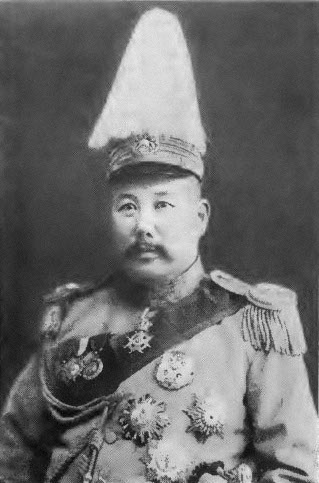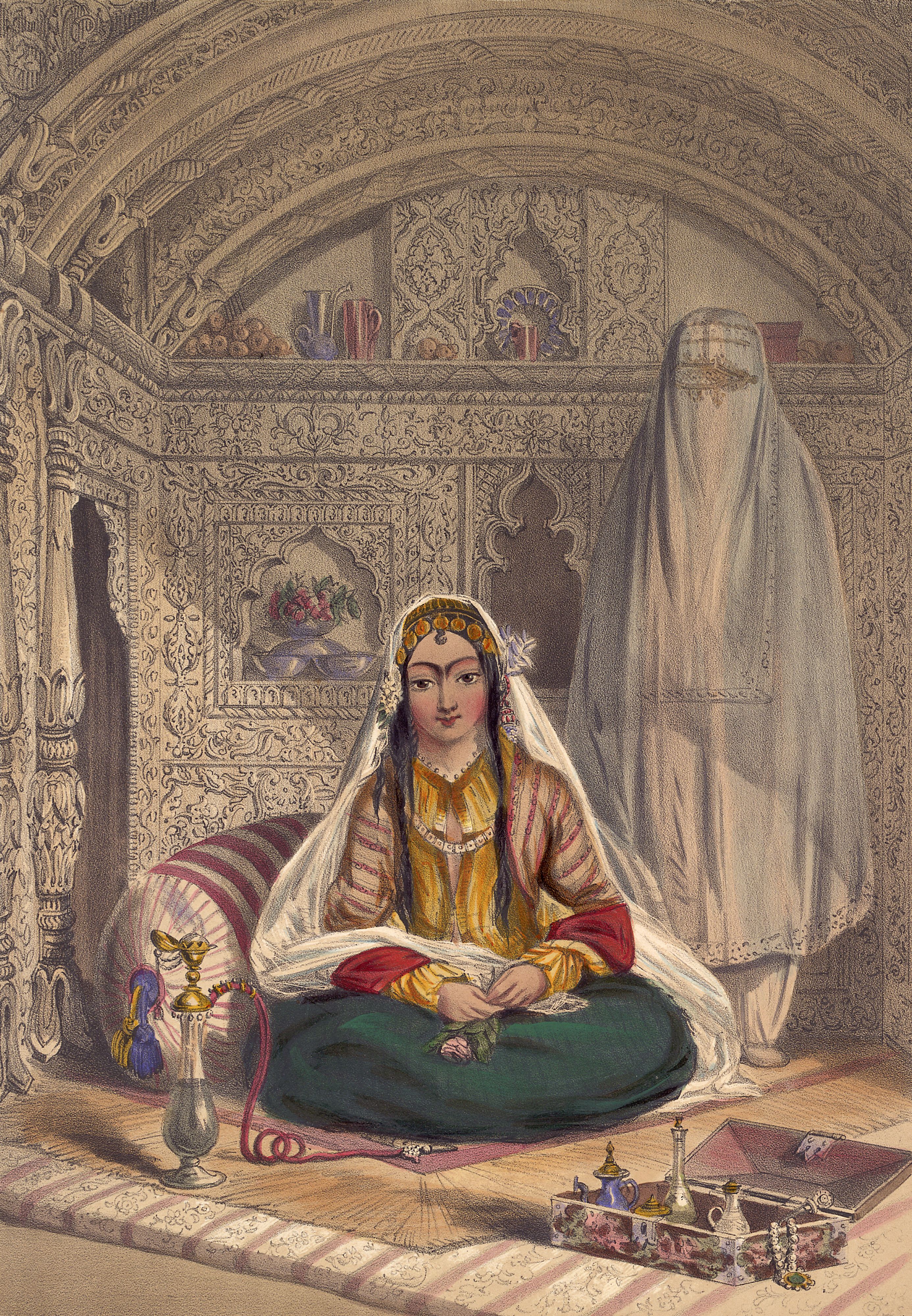|
Ma Fuxing
Ma Fuxing (Ma Fu-hsing in Wade Giles; 1864–1924) was a Hui born in Yunnan, in Qing dynasty China. He was an ex-convict. During Yang Zengxin's reign in Xinjiang, Ma was appointed as a military commander, and then Titai of Kashgar. Ma Fuxing served as a general for the Qing dynasty. He joined the Kansu Braves during the Boxer Rebellion, under the command of Gen. Ma Fulu and fought against the foreign forces during the Siege of the International Legations (Boxer Rebellion) and Battle of Peking. After the fall of the Qing dynasty he started working for Yang Zengxin and recruited Dungan troops for him in 1911, and was posted in 1916 to Kashgar. In 1924 Yang intercepted some correspondence between Ma and the Zhili clique and became suspicious. Ma Fuxing was appointed as the commander of 2,000 Hui soldiers by Yang Zengxin. Reign His reign was notorious for its repressiveness and his excesses. He kept a harem of Uighur wives, and a hay cutting machine for severing the limbs of ... [...More Info...] [...Related Items...] OR: [Wikipedia] [Google] [Baidu] |
Ma Fuxiang
Ma Fuxiang (, Xiao'erjing: , French romanization: Ma-Fou-hiang or Ma Fou-siang; 4 February 1876 – 19 August 1932) was a Chinese military and political leader spanning the Qing Dynasty through the early Republic of China and illustrated the power of family, the role of religious affiliations and the interaction of Inner Asian China and the national government of China. He was a prominent Muslim warlord in northwest China. Ma Fuxiang originally served under Dong Fuxiang, like other Ma Clique Muslim warlords such as Ma Anliang. Ma was born in Linxia, Gansu. He was named the military governor of Xining and then of Altay, in Qing times. He held a large number of military posts in the northwestern region after the founding of the republic. He was governor of Qinghai in 1912, Ningxia from 1912 to 1920, and Suiyuan from 1920 to 1925. Having turned to Chiang Kai-shek in 1928, he was made chairman (governor) of the government of Anhui in 1930. He was elected a member of the Nationa ... [...More Info...] [...Related Items...] OR: [Wikipedia] [Google] [Baidu] |
Ma Fulu
Ma Fulu (Chinese: 马福禄, Pinyin: Mǎ Fúlù, Xiao'erjing: ; 1854 – 1900), a Chinese Muslim, was the son of General Ma Qianling and the brother of Ma Fucai, Ma Fushou and Ma Fuxiang. He was a middle born son. In 1880, Ma Fulu went to Beijing to take advanced military exams when he had an audience before the Emperor. He accidentally committed a faux pas since he did not know proper palace etiquette and subsequently served as a guard for the Emperor to make up for this incident. He studied at a martial arts hall and military school. In 1895, he served under general Dong Fuxiang, leading loyalist Chinese Muslims to crush a revolt by rebel Muslims in the Dungan revolt (1895–1896). His loyalist Muslim troops slaughtered and beheaded the rebel Muslims and his commanding officers received the heads of the rebels from Ma. In 1897, a military Jinshi degree was awarded to Ma Fulu. Ma was transferred along with his brother Ma Fuxiang and several cousins to serve as officers under ... [...More Info...] [...Related Items...] OR: [Wikipedia] [Google] [Baidu] |
1924 Deaths
Nineteen or 19 may refer to: * 19 (number), the natural number following 18 and preceding 20 * one of the years 19 BC, AD 19, 1919, 2019 Films * ''19'' (film), a 2001 Japanese film * ''Nineteen'' (film), a 1987 science fiction film Music * 19 (band), a Japanese pop music duo Albums * ''19'' (Adele album), 2008 * ''19'', a 2003 album by Alsou * ''19'', a 2006 album by Evan Yo * ''19'', a 2018 album by MHD * ''19'', one half of the double album ''63/19'' by Kool A.D. * ''Number Nineteen'', a 1971 album by American jazz pianist Mal Waldron * ''XIX'' (EP), a 2019 EP by 1the9 Songs * "19" (song), a 1985 song by British musician Paul Hardcastle. * "Nineteen", a song by Bad4Good from the 1992 album '' Refugee'' * "Nineteen", a song by Karma to Burn from the 2001 album ''Almost Heathen''. * "Nineteen" (song), a 2007 song by American singer Billy Ray Cyrus. * "Nineteen", a song by Tegan and Sara from the 2007 album '' The Con''. * "XIX" (song), a 2014 song by Slipk ... [...More Info...] [...Related Items...] OR: [Wikipedia] [Google] [Baidu] |
1854 Births
Events January–March * January 4 – The McDonald Islands are discovered by Captain William McDonald aboard the ''Samarang''. * January 6 – The fictional detective Sherlock Holmes is perhaps born. * January 9 – The Teutonia Männerchor in Pittsburgh, U.S.A. is founded to promote German culture. * January 20 – The North Carolina General Assembly in the United States charters the Atlantic and North Carolina Railroad, to run from Goldsboro through New Bern, to the newly created seaport of Morehead City, near Beaufort. * January 21 – The iron clipper runs aground off the east coast of Ireland, on her maiden voyage out of Liverpool, bound for Australia, with the loss of at least 300 out of 650 on board. * February 11 – Major streets are lit by coal gas for the first time by the San Francisco Gas Company; 86 such lamps are turned on this evening in San Francisco, California. * February 13 – Mexican troops force William Wa ... [...More Info...] [...Related Items...] OR: [Wikipedia] [Google] [Baidu] |
Ma Clique
The Ma clique or Ma family warlords is a collective name for a group of Hui (Muslim Chinese) warlords in Northwestern China who ruled the Chinese provinces of Qinghai, Gansu and Ningxia for 10 years from 1919 until 1928. Following the collapse of the Qing dynasty in 1912, the region came under Chinese Muslim warlord Ma Qi's control until the Northern Expedition by the Republic of China consolidated central control in 1928. There were three families in the Ma clique ("Ma" 馬/马, meaning "horse," being a common Hui rendering of the common Muslim name "Muhammad"), each of them respectively controlled 3 areas, Gansu, Qinghai, and Ningxia. The three most prominent members of the clique were Ma Bufang, Ma Hongkui, and Ma Hongbin, collectively known as the Xibei San Ma (, ''Three horses of the Northwest''). Some contemporary accounts, such as Edgar Snow's, described the clique as the "Four Ma" (rather than Three), adding Ma Bufang's brother Ma Buqing to the list of the top warlords. Ot ... [...More Info...] [...Related Items...] OR: [Wikipedia] [Google] [Baidu] |
Daotai
A circuit ( or ) was a historical political division of China and is a historical and modern administrative unit in Japan. The primary level of administrative division of Korea under the Joseon and in modern North and South Korea employs the same Chinese character as the Chinese and Japanese divisions but, because of its relatively greater importance, is usually translated as province instead. China Circuits originated in China during the Han dynasty and were used as a lower-tier administrative division, comparable to the county (, also translated as "districts"). They were used only in the fringes of the empire, which were either inhabited primarily by non-Han Chinese peoples or too geographically isolated from the rest of the Han centers of power. The system fell into disuse after the collapse of the Western Jin dynasty. The administrative division was revived in 627 when Tang Emperor Taizong made it the highest level administrative division and subdivided China into ten ... [...More Info...] [...Related Items...] OR: [Wikipedia] [Google] [Baidu] |
Padishah
Padishah ( fa, پادشاه; ; from Persian: r Old Persian: *">Old_Persian.html" ;"title="r Old Persian">r Old Persian: * 'master', and ''shāh'', 'king'), sometimes Romanization of Persian, romanised as padeshah or padshah ( fa, پادشاه; ota, پادشاه, pādişah; tr, padişah, ; ur, , hi, बादशाह, baadashaah), is a superlative sovereign title of Persian origin. A form of the word is known already from Middle Persian, or Pahlavi language, as ''pātaxšā(h)'' or ''pādixšā(y)''. Middle Persian ''pād'' may stem from Avestan ''paiti'', and is akin to Pati (title). ''Xšāy'', "to rule", and ''xšāyaθiya,'' "king", are from Old Persian. It was adopted by several monarchs claiming the highest rank, roughly equivalent to the ancient Persian notion of "Great King", and later adopted by post-Achaemenid and the Mughal emperors of India. However, in some periods it was used more generally for autonomous Muslim rulers, as in the '' Hudud al-'Alam'' of the ... [...More Info...] [...Related Items...] OR: [Wikipedia] [Google] [Baidu] |
Uyghur People
The Uyghurs; ; ; ; zh, s=, t=, p=Wéiwú'ěr, IPA: ( ), alternatively spelled Uighurs, Uygurs or Uigurs, are a Turkic ethnic group originating from and culturally affiliated with the general region of Central Asia, Central and East Asia. The Uyghurs are recognized as native to the Xinjiang Uyghur Autonomous Region in Northwest China. They are one of Ethnic minorities in China, China's 55 officially recognized ethnic minorities. The Uyghurs are recognized by the Government of China, Chinese government as a Regional language, regional minority and the Titular nation, titular people of Xinjiang. The Uyghurs have traditionally inhabited a series of Oasis, oases scattered across the Taklamakan Desert within the Tarim Basin. These oases have historically existed as independent states or were controlled by many civilizations including History of China, China, the Mongol Empire, Mongols, the Tibetan Empire, Tibetans and various List of Turkic dynasties and countries, Turkic po ... [...More Info...] [...Related Items...] OR: [Wikipedia] [Google] [Baidu] |
Harem
Harem (Persian: حرمسرا ''haramsarā'', ar, حَرِيمٌ ''ḥarīm'', "a sacred inviolable place; harem; female members of the family") refers to domestic spaces that are reserved for the women of the house in a Muslim family. A harem may house a man's wife or wives, their pre-pubescent male children, unmarried daughters, female domestic servants, and other unmarried female relatives. In harems of the past, slave concubines were also housed in the harem. In former times some harems were guarded by eunuchs who were allowed inside. The structure of the harem and the extent of monogamy or polygamy has varied depending on the family's personalities, socio-economic status, and local customs. Similar institutions have been common in other Mediterranean and Middle Eastern civilizations, especially among royal and upper-class families, and the term is sometimes used in other contexts. In traditional Persian residential architecture the women's quarters were known as ''andar ... [...More Info...] [...Related Items...] OR: [Wikipedia] [Google] [Baidu] |
Zhili Province
Zhili, alternately romanized as Chihli, was a northern administrative region of China since the 14th-century that lasted through the Ming dynasty and Qing dynasty until 1911, when the region was dissolved, converted to a province, and renamed Hebei in 1928. History The name ''Zhili'' means "directly ruled" and indicates regions directly ruled by the imperial government of China. Zhili province was first constituted during the Ming dynasty when the capital of China was located at Nanjing along the Yangtze River. In 1403, the Ming Yongle Emperor relocated the capital to Beiping, which was subsequently renamed Beijing.Susan Naquin, ''Peking: Temples and City Life, 1400-1900'', p xxxiii The region known as North Zhili was composed of parts of the modern provinces of Hebei, Henan, Shandong, including the provincial-level municipalities of Beijing and Tianjin. There was another region located around the "reserve capital" Nanjing known as South Zhili that included parts of what are t ... [...More Info...] [...Related Items...] OR: [Wikipedia] [Google] [Baidu] |
Battle Of Peking (1900)
The Battle of Peking, or historically the Relief of Peking, was the battle fought on 14–15 August 1900 in Peking, in which the Eight-Nation Alliance relieved the siege of the Peking Legation Quarter during the Boxer Rebellion. From 20 June 1900, Boxers and Imperial Chinese Army troops had besieged foreign diplomats, citizens and soldiers within the legations of Austria-Hungary, Belgium, Britain, France, Italy, Germany, Japan, Netherlands, Russia, Spain and the United States. Background The first attempt to relieve the legations by a force of over 2,000 sailors and marines commanded by British Admiral Edward Seymour was turned back by strong opposition on 26 June. On 4 August a second, much larger relief force, called the Eight-Nation Alliance, marched from Tientsien (Tianjin) toward Peking. The alliance force consisted of 22,000 troops from the following countries: United States - 2,000 (soldiers and marines with artillery); Japan - 10,000; Russia - 4,000 (infantry, Cossa ... [...More Info...] [...Related Items...] OR: [Wikipedia] [Google] [Baidu] |





